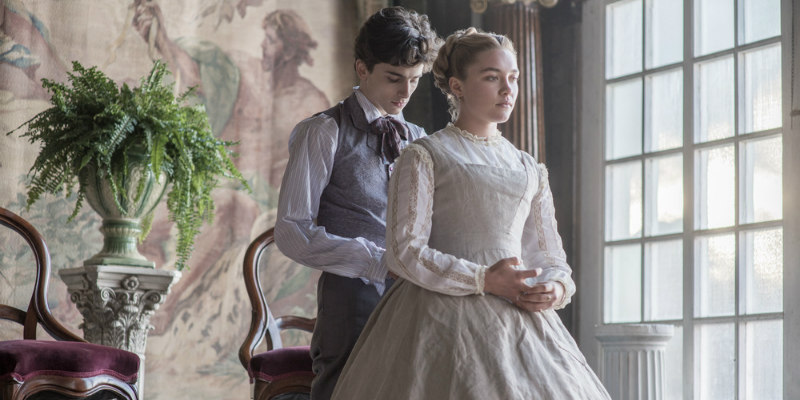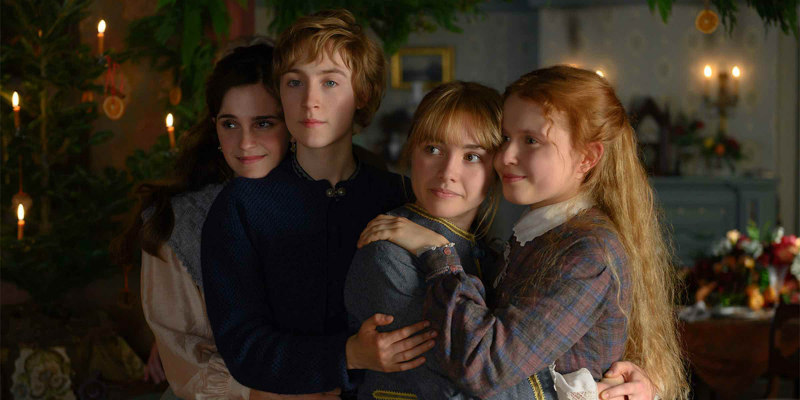Review by
Eric Hillis
Directed by: Greta Gerwig
Starring: Saoirse Ronan, Emma Watson, Florence Pugh, Eliza
Scanlen, Laura Dern, Timothée Chalamet, Tracy Letts, Bob Odenkirk, James
Norton, Louis Garrel, Meryl Streep, Chris Cooper

Greta Gerwig's adaptation of Louisa May Alcott's Little Women opens and closes with two cracking scenes. Playing an amalgamation of Alcott and her novel's heroine, Jo March, Saoirse Ronan sparkles in her interactions with Dashwood, a stoic publisher played by the always watchable Tracy Letts. Not wanting sexism to scupper her chances, Jo presents him with one of her short stories, which she claims was written by "a friend." Dashwood huffs, puffs and frowns as he quickly casts his eye over her work, striking a line through entire swathes of text before exclaiming "I'll take it!" If you've ever pitched your work to an editor, it's a scene that will resonate, as Gerwig perfectly encapsulates the paranoia, self-doubt, joy and relief of such an interaction. Later on we see the pleasure on Jo's face as her meta version of 'Little Women' the book rolls off the printing presses, and any writer who has felt the glow that comes with finally seeing their name in print will leave the cinema with a warm, fuzzy feeling in their tummy. It's a shame that these delightful bookends bracket a film that is otherwise an emotionally uninvolving mess.
Alcott's novel is split into two distinct parts, which were even published separately in some territories. The first introduces us to the teenage March sisters, played here by Ronan, Florence Pugh, Emma Watson and Eliza Scanlen as Jo, Amy, Meg and Beth respectively. Jo, Amy and Beth all harbour creative aspirations - Jo wishes to be a writer, Amy a painter and Beth a musician - while Meg simply wants to get married and raise a family of her own. Jo and Amy find themselves at each other's throats thanks to their mutual attraction to handsome young flibbertigibbet Laurie (Timothée Chalamet, chalameting like he's never chalameted before).

The second part of the novel takes us three years ahead, with Jo now living in a New York boarding house while she pursues her dreams of becoming a published author. Meg has settled down with a husband, but finds married life isn't all she thought it would be. Beth has grown sickly from scarlet fever. Amy embarks on a romance with Laurie in Europe.
[ READ MORE: New Release Review - The Unforgivable ]
For her adaptation, Gerwig chops up the timeline to tell Alcott's story in non-linear fashion, beginning with Jo in New York and unveiling details in flashbacks. Despite a running time of 135 minutes, this Little Women feels like an adaptation of Little Women's Cliff Notes rather than of the book itself, and with scenes played out of their original order, much of the emotional impact is lost, as we're not yet clued into what the characters (or indeed, Alexandre Desplat's incessant and intrusive score) are so upset or elated about.

Entire subplots seem to have been left on the cutting room floor, as though Dashwood liberally ran his pen through the first draft of Gerwig's script. Jo and Laurie have a meet cute at the beginning of the movie, but we never see them interact again until roughly 100 minutes later, when the latter is declaring his undying love for the former, even suggesting he might take his own life if he can't be with her. Wait, what? Where did this come from? We've seen no evidence of such feelings from Laurie. In fact, we've barely seen Laurie. Likewise, there's a scene late on where one character mournfully talks about the joy they derived from their relationship with another character, but the film gave us scant visual evidence of said relationship. It's a film that constantly asks the audience to take it's word for all the things it tells us while showing us very little. With no scenes lasting longer than a couple of minutes, Gerwig's movie never allows its scenes to breathe as it races to an unconvincing climax. It's tailor-made for high school students who are too lazy to read the book but who wish to be able to dole out its key plot points if quizzed.
[ READ MORE: New Release Review - Lapwing ]
Attempting to give all four March sisters equal due is a task the film struggles with, and in doing so we end up never really getting to know any of them. They often tell us how they're feeling, but the movie rarely shows us what they're feeling. The film is incessantly talky, with so much dialogue that your mind begins to treat it like white noise, shutting it out to focus instead on the immaculate production and costume design. Only Laura Dern and Chris Cooper, as the sisters' mother and their kindly rich neighbour respectively, are afforded scenes in which they're allowed to act without moving their lips.

It's redundant to point out that a novel published in 1868 hasn't aged well in its treatment of social concerns, but it would have been easy to remove Little Women's tone deafness when it comes to the lack of acknowledgement of just how privileged its protagonists are. The March sisters moan about being "poor" while living in a large house with a live-in maid, attending luxurious balls and dressing in relatively expensive clothes. In a scene that has all the emotional heft of a Sainsbury's Christmas commercial, the sisters are persuaded by their mother to donate their Christmas breakfast to some actual poor people, a family of German immigrants. When the girls return they find their breakfast has been replaced in high style by the aforementioned kindly rich neighbour, their dining table crammed with sweet treats, as the film momentarily becomes a Republican party promo espousing the virtues of trickle down economics. The girls have plenty of legitimate gripes concerning the role of women in 19th century society (and 21st in some cases), but such concerns are dampened somewhat by setting the story against the backdrop of the civil war, a time when the cons of being male certainly outweighed the pros.

Little Women is on Netflix UK/ROI
now.

